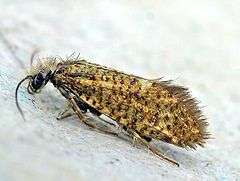Eriocraniidae
| Eriocraniidae | |
|---|---|
 | |
| Eriocrania semipurpurella | |
| Scientific classification | |
| Kingdom: | Animalia |
| Phylum: | Arthropoda |
| Class: | Insecta |
| Order: | Lepidoptera |
| Suborder: | Glossata |
| Infraorder: | Dacnonypha Hinton, 1946 sensu Minet, 2002[1] |
| Superfamily: | Eriocranioidea |
| Family: | Eriocraniidae Rebel, 1901 |
| Genera | |
|
Dyseriocrania | |
| Diversity | |
| 25 described species | |
Eriocraniidae is a family of moths restricted to the Holarctic region, with six extant genera.[2][3] These small, metallic moths are usually day-flying, emerging fairly early in the northern temperate Spring. They have a proboscis with which they drink water or sap. The larvae are leaf miners on Fagales, principally the trees birch (Betula) and oak (Quercus) but a few on Salicales and Rosales.[4]
References
- ↑ Joël Minet (2002). "Un nom d'infra-ordre pour les Acanthopteroctetidae (Lepidoptera)" [Proposal of an infraordinal name for the Acanthopteroctetidae (Lepidoptera)]. Bulletin de la Société entomologique de France. 107 (3): 222.
- ↑ Donald R. Davis (1978). "A revision of the North American moths of the superfamily Eriocranioidea with the proposal of a new family, Acanthopteroctetidae (Lepidoptera)" (PDF). Smithsonian Contributions to Zoology. 251: 1–131. doi:10.5479/si.00810282.251.
- ↑ Hitomi Mizukawa, Toshiya Hirowatari & Satoshi Hashimoto (2004). "Biosystematic study of Issikiocrania japonicella Moriuti (Lepidoptera: Eriocraniidae), with description of immature stages". Entomological Science. 7 (4): 389–397. doi:10.1111/j.1479-8298.2004.00088.x.
- ↑ N. P. Kristensen (1999). "The homoneurous Glossata". In N. P. Kristensen. Lepidoptera, Moths and Butterflies. Volume 1: Evolution, Systematics, and Biogeography. Handbuch der Zoologie. Walter de Gruyter. pp. 51–64.
External links
- Tree of Life
- Fauna Europaea
- Generic Names and their Type-species
- British moth Leaf Mines
- Watson, L., and Dallwitz, M.J. 2003 onwards. British insects: the families of Lepidoptera. Version: 29 December 2011 Detailed description and figures including wing venation.
-
 Data related to Eriocraniidae at Wikispecies
Data related to Eriocraniidae at Wikispecies
This article is issued from Wikipedia - version of the 10/14/2015. The text is available under the Creative Commons Attribution/Share Alike but additional terms may apply for the media files.